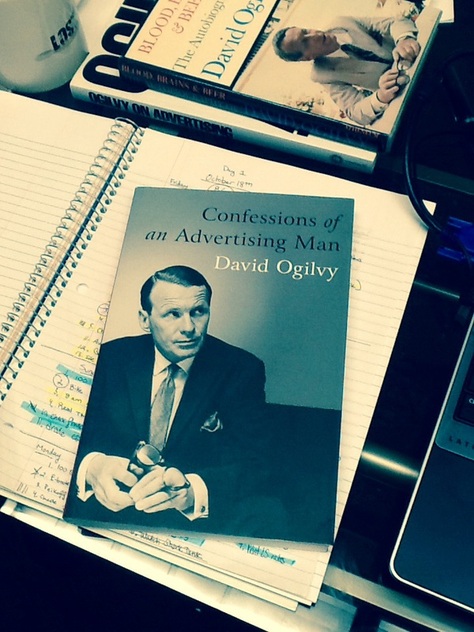| I first picked up David Ogilvy’s Confessions of an Advertising Man after binge-watching AMC’s Mad Men. The TV series’ protagonist, an adulterous New York ad man named Don Draper, certainly wasn't the happiest white-collar guy. But I was attracted to his confidence, poise, and good-isn't-good-enough work ethic. Draper’s reserved demeanor was legendary to his creative department; he instilled both fear and a desire to impress. His candor with his subordinates’ work (and his own) meant long nights of restarting ad campaigns and weekends of copy tweaks in the office. Best of all, Draper often faced off against clients in which he displayed his abilities to both seduce and aggressively bridle them with his vision for their product (His vision was usually better). Plus the 50’s and 60’s were two classy decades of Americana: suits all the time, real alcoholic beverages, and cars that didn't look like electric shavers. “You're our David Ogilvy,” a Partner says to Draper, trying to woo the Creative Director with Partner status. Competing firms had begun poaching him, but he was already growing restless in a firm too small for his work. In fact he'd previously rejected a contract offer (of course taking the pay raise that accompanied it). But who was this David Ogilvy mentioned? Was he like Don Draper, only real? I had to know. Based off the title and the Mad Men association, I imagined Ogilvy’s story of how he created an ad agency from $6000 to one that boasted $55,000,000 in billings a humble 15 years later, to be rife with conflict (affairs, lies, and lawsuits). That couldn't be further from the truth. In fact, Ogilvy’s methods emphasized honesty; staying in constant alignment with the facts of reality: I. On speaking the truth to customers: You wouldn't tell lies to your own wife. Don’t tell them to mine…If you tell lies about a product you will be found out – either by the Government which will prosecute you, or by the consumer, who will punish you by not buying the product for a second time. Good products can be sold by honest advertising. If you don’t think the product is good, you have no business advertising it. From the beginning, Ogilvy built his “shoestring” agency by advertising products he believed to be most valuable. In 1948, on the second day of business, he listed the five clients he wanted most: General Foods, Bristol-Meyers, Campbell Soup Company, Lever Brothers, and Shell. To pick such blue-chip clients was an act of mad presumption, but all five of them are now clients of Ogilvy, Benson & Mather. Why these five?: Are these not the finest goods and services on earth? I think they are, and that is why I advertise them. II. On speaking the truth to clients: When Henry VIII was dying, it was believed that any man who dared to tell him the awful truth would be decapitated. But reasons of state required that a volunteer should be found, and Henry Denny stepped forward. King Henry was so grateful to Denny for his courage that he gave him a pair of gloves and a knighthood. Sir Henry Denny was my ancestor. His example inspires me to tell you that your advertising is very bad. When an antique dealer draws my attention to flaws in a piece of furniture, he wins my confidence. In a great kitchen, one must always honor what one has promised on the menu. III. On respecting what actually sells (vs. what’s ‘creative’): When I write an advertisement, I don't want you to tell me that you find it 'creative'. I want you to find it so interesting that you buy the product…When Aeschines spoke, they said, 'How well he speaks.' But when Demosthenes spoke, they said, 'Let us march against Philip.’ I’m for Demosthenes. Ogilvy’s fidelity to his work's actual effects on sales may seem the most intuitive thing in the world, but it takes a great deal of courage to face uncomfortable truths about our work’s actual quality (especially when people seem so invested in crafting not greatness but the appearance of greatness). I’m thinking back to Don Draper’s world of carefully crafted facades and secrets, both personal and business. But in contrast, Ogilvy’s own confessions are much juicer. IV. On worshiping greatness, especially in others: When you are appointed to head an office in the Ogilvy & Mather chain, I send you one of these Russian dolls. Inside the smallest you will find this message: ‘If each of us hires people who are smaller than we are, we shall become a company of dwarfs. But if each of us hires people who are bigger than we are, Ogilvy & Mather will become a company of giants.’ This may seem counter-intuitive, but there’s actually no clash between two co-workers competing for success, not if both are honest about ability and results. Even if one 'loses' out on a promotion and it goes to another more qualified candidate, both will benefit from a stronger company. Both have won. Is it more practical to work at a business that rewards not the most skillful go-getters but the inefficient ones? That business wouldn't be a business for long. Ogilvy’s was and is. I admire people who hire subordinates who are good enough to succeed them. I pity people who are so insecure that they feel compelled to hire inferiors as their subordinates. Ogilvy's first lesson to me: Speak the truth publicly to others and privately to yourself. Honest evaluations allow you to face reality and act accordingly. Develop the courage to see your work and others' honestly. * * * I highly recommend reading these others by the “Father of Advertising” (even if you don't work in marketing): Blood, Brains, and Beer (His autobiography) Ogilvy on Advertising (Inside the mind of a genius) |
|
3 Comments
|


